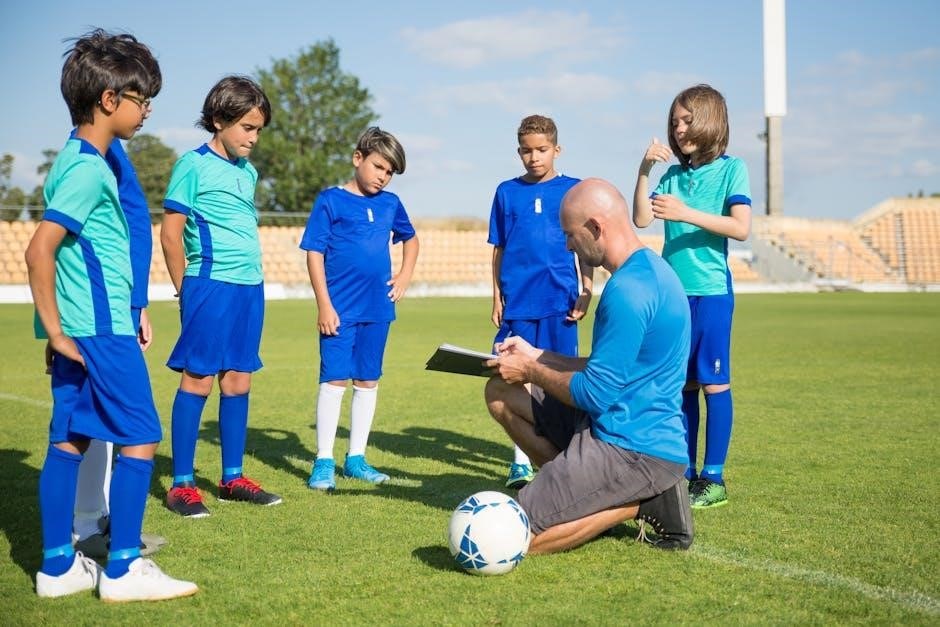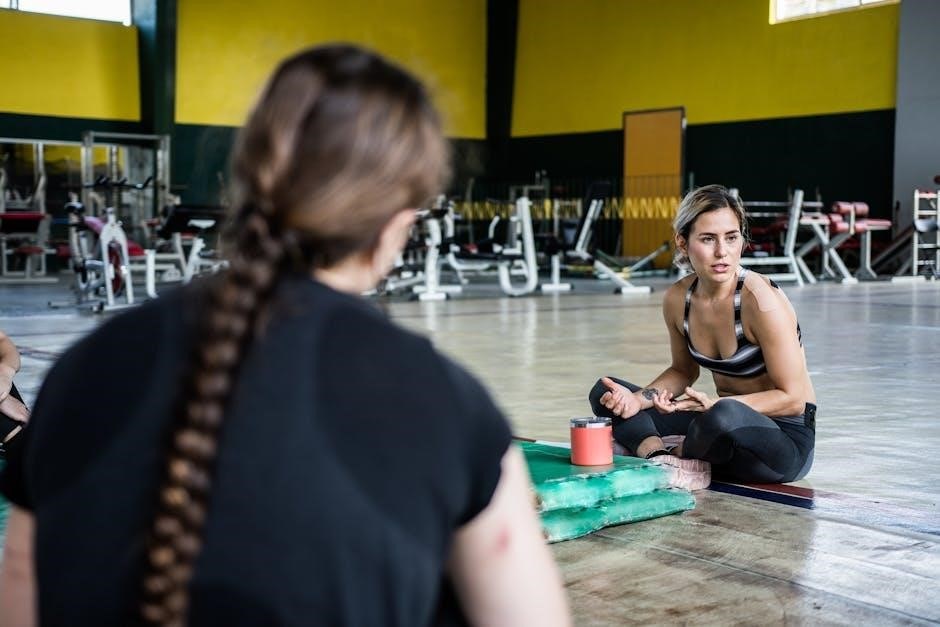instructional coach supplies
- Published
- in Instructions
Instructional coaching is a supportive process empowering educators to enhance teaching methods. Essential supplies include digital tools, formative assessments, and resources for differentiated instruction and professional development.
The Role of an Instructional Coach in Education
An instructional coach supports educators in improving teaching practices through professional development, resource sharing, and data-driven strategies. They facilitate collaboration, provide feedback, and help integrate innovative tools to enhance student learning outcomes. Coaches act as mentors, guiding teachers in adopting effective instructional methods and technologies, ensuring alignment with educational goals and fostering a culture of continuous improvement in the classroom.
Key Responsibilities of an Instructional Coach
Instructional coaches conduct needs assessments, design professional development, and provide one-on-one mentoring. They model effective teaching strategies, analyze student data, and facilitate collaborative teams. Coaches also curate resources, offer feedback, and help teachers implement innovative tools. Their role involves fostering a growth mindset among educators, ensuring alignment with educational standards, and supporting the integration of technology to enhance student engagement and academic achievement.

Essential Supplies for Instructional Coaches
Instructional coaches rely on digital tools, physical supplies, and professional development resources. Key items include books, research materials, and technology for designing engaging and effective coaching sessions.
Physical Supplies for Coaching Sessions
Physical supplies are crucial for effective coaching sessions, including planners, sticky notes, and whiteboard markers for brainstorming. Coaches often use binders, folders, and printed materials for organizing resources. Visual aids like charts and manipulatives help demonstrate concepts. Portable tools such as document cameras and tablets enable hands-on demonstrations. These supplies facilitate collaboration, observation, and hands-on learning, ensuring coaches can support teachers in creating engaging and structured lessons.
Digital Tools for Instructional Design
Digital tools like Camtasia, Quality Matters, and learning management systems (LMS) are essential for instructional design. These platforms enable coaches to create engaging content, assess lessons, and facilitate professional development. Tools like screen recording software and presentation aids help in delivering clear, structured materials. Digital resources also support differentiated instruction and data-driven strategies, ensuring coaches can effectively collaborate with teachers and improve student outcomes through innovative and accessible solutions.

Professional Development Resources
Professional development resources include books, research-based materials, and online courses. These tools support continuous learning, helping coaches refine skills and implement evidence-based practices effectively in educational settings;
Books and Research-Based Materials
Essential books and research-based materials provide instructional coaches with evidence-based strategies. Titles focusing on differentiated instruction, formative assessment, and coaching models are invaluable. These resources enhance teaching methods, offering practical techniques for classroom implementation. Research-based materials ensure coaches stay updated on best practices, supporting continuous improvement in educational settings. They also include frameworks for professional development, aiding coaches in fostering teacher growth and student success effectively.
Online Courses and Workshops
Online courses and workshops are vital for instructional coaches’ professional growth. Platforms offer training on instructional design, technology integration, and culturally responsive teaching. These resources provide evidence-based strategies, fostering continuous improvement. Workshops often include hands-on activities, enabling coaches to refine their skills. Courses like those on Camtasia and Quality Matters certification are highly recommended, ensuring coaches stay updated on best practices and enhance teaching strategies effectively.
Data-Driven Instructional Strategies
Data-driven strategies involve collecting and analyzing student performance data. Tools like formative assessments and Learning Management Systems help instructional coaches make informed decisions, enhancing teaching effectiveness and student outcomes.
Formative Assessment Tools
Formative assessment tools are crucial for monitoring student progress. Instructional coaches use quizzes, exit tickets, and digital platforms like Kahoot and Mentimeter to gather real-time data. These tools help identify learning gaps, allowing coaches to adjust strategies and provide targeted support. By leveraging formative assessments, educators can make data-driven decisions, ensuring personalized instruction and improved student outcomes. These tools are essential for effective instructional coaching and teacher collaboration.
Learning Management Systems (LMS)
Learning Management Systems (LMS) are essential for organizing and delivering instructional content. Platforms like Canvas, Google Classroom, and Schoology allow coaches to share resources, track progress, and collaborate with teachers. LMS tools streamline communication, enabling coaches to provide targeted support and access to materials. They also facilitate data-driven decisions, enhancing the overall coaching process and improving educator effectiveness. These systems are vital for modern instructional coaching practices.

Collaboration and Communication Tools
Tools like Slack, Microsoft Teams, and Google Workspace facilitate seamless communication and collaboration among instructional coaches and teachers, enhancing planning and resource sharing for improved student outcomes.
Communication Apps for Teacher Collaboration
Communication apps like Slack, Microsoft Teams, and Google Workspace are essential for instructional coaches. These tools enable real-time collaboration, document sharing, and organized discussions. They facilitate seamless interaction between coaches and teachers, fostering effective planning and resource exchange. Additionally, apps like Trello and Asana help manage tasks and projects, ensuring alignment and accountability in instructional strategies.
Professional Learning Community (PLC) Materials
PLC materials include collaborative tools, data trackers, and research-based guides. Coaches use agendas, meeting templates, and reflection journals to structure discussions. Resources like PLC books and online modules provide frameworks for improving instruction. These materials help teams analyze data, set goals, and implement strategies, fostering a culture of continuous improvement and student-focused collaboration.

Technology Integration in Coaching
Technology integration involves tools like Camtasia for video creation and Canva for visual aids. These resources enhance content delivery, enabling coaches to create engaging, interactive materials and share knowledge effectively.
Video and Screen Recording Software
Video and screen recording software, such as Camtasia, is essential for instructional coaches. It enables them to create tutorials, demonstrate techniques, and provide feedback. Coaches can record lessons, share best practices, and offer asynchronous support. These tools enhance professional development by allowing teachers to review and reflect on instructional strategies. They also facilitate communication and collaboration, making coaching more accessible and effective for educators.
Presentation and Visual Aid Tools
Presentation and visual aid tools, such as PowerPoint, Google Slides, and Canva, are vital for instructional coaches. These tools help create engaging presentations, infographics, and lesson plans. Coaches use them to design clear, visually appealing materials that enhance teacher understanding. Interactive features like polls and quizzes can also be incorporated to make sessions more dynamic. These tools ensure that coaching sessions are both informative and visually stimulating, fostering better engagement and comprehension.

Differentiated Instruction Supplies
Differentiated instruction supplies include leveled readers, manipulatives, and adaptive technology. These tools help tailor instruction to diverse learning needs, ensuring equitable access to content for all students.
Leveled Readers and Learning Resources
Leveled readers are essential for differentiated instruction, offering texts at varying reading levels to match student abilities. These resources help build fluency and comprehension. Coaches use them to scaffold learning, ensuring each student progresses at their own pace; Additionally, learning resources like graphic organizers and vocabulary cards support diverse needs, fostering an inclusive and effective learning environment for all students.
Manipulatives for Hands-On Learning
Manipulatives are hands-on tools that engage students in active learning, fostering deeper understanding of concepts. Examples include blocks, counting bears, and geometric shapes. These resources enable tactile exploration, making abstract ideas concrete. Coaches often recommend manipulatives to support differentiated instruction, allowing teachers to cater to diverse learning styles. They are particularly effective in math and STEM subjects, promoting problem-solving and critical thinking through interactive, visual, and kinesthetic experiences.

Coaching Cycles and Feedback Tools
Coaching cycles and feedback tools are essential for fostering growth and improvement. They include observation forms, reflection guides, and digital platforms to track progress and provide constructive insights.
Coaching Models and Frameworks
Coaching models and frameworks provide structured approaches for instructional coaches to guide teacher development. Tools like the GROW model and Coaching Cycle Framework help plan, implement, and assess coaching cycles. These models emphasize goal-setting, observation, and feedback, ensuring aligned and impactful professional growth. They also support the integration of resources and technologies, fostering a collaborative environment for educators to refine their practices and enhance student outcomes effectively.
Feedback and Reflection Tools
Feedback and reflection tools are vital for instructional coaches to assess progress and guide improvement. Digital tools like surveys, video recordings, and collaborative platforms enable constructive feedback. Reflection journals and peer discussions also foster professional growth. These tools help coaches and educators identify strengths, areas for development, and actionable steps to enhance teaching practices and student outcomes effectively.

Cultural Responsiveness in Coaching
Culturally responsive coaching involves diverse texts and inclusive materials. These supplies help coaches foster equitable learning environments, addressing varied student needs and backgrounds effectively.
Culturally Responsive Teaching Materials
Culturally responsive teaching materials are essential for fostering inclusivity. These resources include diverse texts, images, and activities reflecting varied backgrounds. Coaches use these tools to promote equity, ensuring all students see themselves represented. Such materials encourage engagement and cater to different learning styles, fostering a sense of belonging. They also help educators address cultural biases and create supportive learning environments tailored to diverse student needs.
Diverse Texts and Resources
Diverse texts and resources enrich instructional coaching by providing varied perspectives. These materials include multicultural literature, case studies, and multimedia content. Coaches use them to help teachers design culturally responsive lessons. Such resources promote empathy and understanding among students. They also support differentiated instruction, catering to diverse learning needs and fostering an inclusive classroom environment. Access to these tools is crucial for creating equitable educational opportunities for all learners.

Organization and Time Management Tools
Planners, scheduling apps, and task management software help instructional coaches organize sessions, track progress, and efficiently manage time, ensuring productive collaboration with educators and effective coaching cycles.
Planners and Scheduling Tools
Instructional coaches rely on planners and scheduling tools to organize coaching cycles and sessions. Digital calendars, shared spreadsheets, and apps like Google Calendar or Trello help manage time effectively. These tools enable coaches to create structured plans, set reminders, and collaborate with teachers seamlessly. By streamlining schedules, coaches ensure efficient use of time and resources, fostering productive relationships and focused professional development opportunities for educators.
Task Management Software
Task management software is essential for instructional coaches to streamline workflows and collaborate effectively. Tools like Trello, Asana, or Microsoft To Do help organize tasks, set deadlines, and monitor progress. These platforms allow coaches to assign tasks, share resources, and track completion in real-time. By enhancing productivity and accountability, task management software ensures coaches can focus on supporting teachers and improving instructional practices efficiently.
Instructional coaching continues to evolve, integrating technology and research-based practices. Future trends emphasize personalized learning, data-driven strategies, and innovative tools to enhance educator support and student outcomes effectively.
Evolution of Instructional Coaching
Instructional coaching has evolved from traditional methods to innovative, tech-integrated approaches. The rise of tools like Camtasia and Quality Matters has enhanced instructional design and assessment. Collaborative teacher teams now focus on data-driven strategies, promoting personalized learning. This shift reflects a broader movement toward evidence-based practices, ensuring educators are equipped with cutting-edge resources to improve teaching and student outcomes effectively.
Emerging Trends in Coaching Supplies
Emerging trends in coaching supplies emphasize digital innovation and data-driven tools. Video platforms like Camtasia enhance instructional design, while Quality Matters frameworks improve course quality. Collaborative PLC tools and culturally responsive materials are gaining traction. Coaches increasingly rely on AI for real-time feedback and personalized learning. These trends reflect a shift toward tech-integrated, evidence-based practices, enabling coaches to address diverse student needs more effectively.
